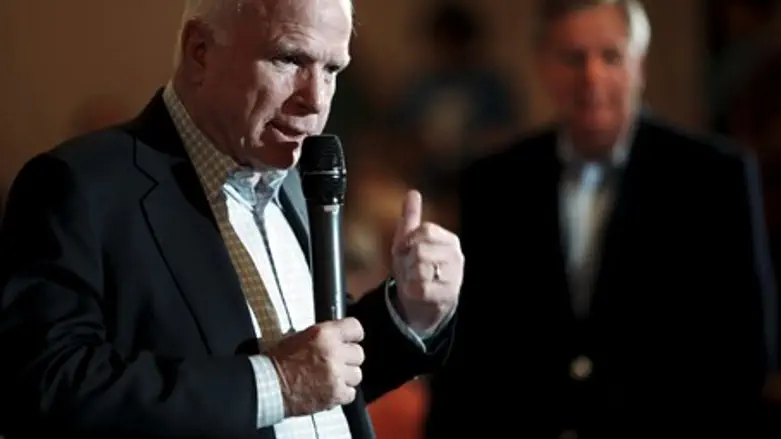
Senator John McCain (R-AZ) said on Wednesday that even though there is no majority in Congress that can override a presidential veto on legislation against the Iran deal, it is clear that there is more opposition than support among lawmakers to removing the sanctions on Iran.
"We currently stand at a critical time, because of the agreement with Iran,” he told Arutz Sheva, adding, “I cannot put myself in the Israelis’ place, but I totally agree with Prime Minister Netanyahu that there is an existential threat to Israel."
"Currently there are not enough votes to override the veto, but the dynamic is not in favor of the administration at all," added McCain.
Addressing the issue of compensation and Netanyahu’s insistence not to talk to the Americans about security-related compensation following the deal with Iran, McCain said the idea makes him uncomfortable. "Any weapons offered in one form or another cannot reassure Israel's real concern over this agreement," he noted.
McCain said the personal relations of President Barack Obama and Prime Minister Netanyahu are not the issue at hand. "The relationship between Israel and the American administration is stronger than ever and does not worry me. I am concerned about the fact that Israel feels threatened by Iran," he told Arutz Sheva.
McCain expressed his dissatisfaction with agreements made directly between Iran and the International Atomic Energy Agency (IAEA) and which Iran has said are “secret” and Congress should not be allowed to review, saying that keeping those agreements secret is unacceptable.
He also dismissed Obama’s argument that the alternative to the agreement is a war, and made it clear that there are other alternatives in his opinion, and that Obama’s statement is one that could have been avoided.
Earlier on Wednesday, Obama delivered a live address to the American public Wednesday, urging them to support the recently signed deal with Iran and to lobby their members of Congress to vote for it.
"We're going to hear a lot of voices against this deal, backed by tens of millions in advertising. And if the rhetoric in these ads sounds familiar, it should - because many of the same people who argued for the war in Iraq are arguing against the Iran nuclear deal," claimed Obama.
He insisted that Iran will be unable to acquire either the plutonium or uranium necessary for nuclear weapons for another 10-15 years under the deal, which he said guarantees "24/7 monitoring" of nuclear sites, with inspectors having full access and a "permanent right to inspect any suspicious facilities in Iran."
Obama also sniped repeatedly at Israel's dogged opposition to the deal - until finally taking several open shots at Netanyahu, who has been the deal's most vocal critic.
Israel, Obama claimed, is alone in opposing the deal - ignoring opposition by Gulf Arab states.
"Every nation in the world which has commented publicly, with the exception of the Israeli government, has supported it," he said.
Obama's remarks were a response to Netanyahu, who in a live webcast Tuesday urged American Jews to oppose the deal.

